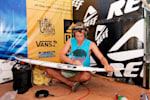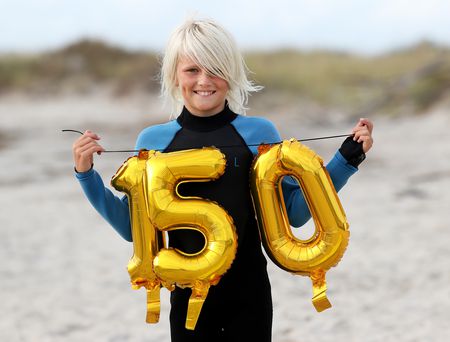You’ve seen those parents. You know, those parents. The ones on the sidelines of soccer games screaming at the ref. The ones who push their kids like a Ukrainian ballet coach. The ones who, let’s face it, compensate for their own shortcomings by living vicariously through their kids.
READ MORE: Top Five Family-Friendly Surf Trips
Josh Kerr is not one of those parents. He had a successful career on the championship tour (a familiar face in the top 10), he was (and still is) a freakishly-talented freesurfer, and he was an innovator of all things above-the-lip (people are still doing the Kerrupt Flip how many years later?). And now, Kerrzy’s kids – Sierra, 12; Colin, 18 – are following in their dad’s footsteps.
Maybe it was in their blood, or maybe they’re just a product of their environment; whatever it was, Kerrzy’s been in full support of his kids and their love of surfing and skateboarding. But unlike other parents with talented kids, Kerrzy only has one simple demand: “Rule number one is, I want to be out there with them. It’s never been about them being the best, whatever sport it is. More than anything, I want to be out there enjoying it with my kids.”
READ MORE: The 10 Best Beginner Surf Spots
So, who better to untangle the machinations of being a good surf parent? We caught up Kerrzy for a full breakdown on what to expect and the do’s and don’ts of surf dad-ing.

One person Kerrzy is happy to let snake him: his son, Colin. Photo: Brendon Short | Top: Sierra Kerr making dad proud.
Every kid is different…
“I had two very different experiences. I came into my son’s life when he was three. I remember boosting him into a wave when he was probably four, just like on his belly, and he got totally dumped. It was a tiny little wave. I didn’t think it was much, but it really scarred him. It took a good while for him to open up to the idea of going surfing with me again.
“And then Sierra on the other hand, she was open to everything really quickly, she’s very self-driven, and wants to get better at everything she does. She hates being bad at things [laughs]. She goes out there to get better. It was very different than Colin.
“So, the moral for me is that every kid is different. Not every kid is gonna want to become the best they can be at that specific thing. With that, you’ve got to just mold the experience to what they want. The good thing about surfing is that it’s more of a lifestyle and you can keep it like that – just having a good time, hanging with friends, and the culture around surfing. There’s more to it than just the sport aspect.”

Parents can be great teachers, but for some kids a professional surf instructor or solid group of surfing friends can make all the difference. Photo: Jeremiah Klein
Peers vs. parents…
“I think when you have good energy peers around you, that helps so much. As a parent, you can only do so much. They get older and they start hanging out with other people and oftentimes what they do is influenced by who they’re hanging out with.
“As a parent you just have to make it as fun and enjoyable as possible. Every kid is different – you just need to cater it to their personality. Maybe they’re not into the performance side of things. Maybe they want to go ride soft-tops and just enjoy themselves with friends. Maybe they don’t want to go out there and try to do the best turn of their lives.
“If they decide they’re going to try and get out there and get after it, they’ll decide that on their own. There’s nothing you can really do about that.”
Know when to bring in the professionals…
“I always just pushed my kids into waves, but I’ve got nothing against surf lessons. There’s some great teachers out there and they know exactly how to work with kids. Some kids work better in that environment, where, it’s not their parents taking the lead. Every kid is different. If they say they want someone else to help them learn, then let it be. Don’t get self-conscious about it.”

Start too young or in conditions beyond a kid’s skill level, and they could be scarred by the experience. Instead, start slow and only when they’re ready. Photo: Jeremiah Klein
Start ’em young, but not too young…
“Five or six is probably a good age to start getting into something. But it needs to stay very relevant, you can’t go further than necessary. You can only really push them into little foamballs. It’s a little much to be training them at that age to ride, like, a 3’ 6” shortboard and force them to try air reverses.
“You need to make sure your kids are going out in waves that match their ability. I really don’t think that kids need to be pushing themselves in terms of waves until they’re at least, like, 15. At that point they should be able to trust their own decisions if they want to push themselves then.”
Walk (or lie down) before you can run…
“Boogieboards, man. Boogieboards are all-time when you’re a little kid. They’re so great for kids to start on and to get comfortable with the ocean before they decide they want to stand up. I’m a big fan of starting kids on boogieboards. I rode a boogie as a kid. I was trying to do barrel rolls until I was like nine years old.
“It helps you learn ocean awareness, and you can feel a sense of independence instead of getting pushed into waves by mom and dad. Kids love that independence. They shouldn’t be out there on a shortboard until they’re strong enough.”
As always, safety first…
“My daughter and I will be paddling out and I always like to point out what I see – whether it’s a rip current or an inside or outside sandbar or a bit of reef or rocks. If you keep pointing things out to them, they’ll start to notice them for themselves. Some kids, and adults for that matter, tend to just paddle out without thinking about it or assessing what’s out there. After years of knowledge, you start to acquire the ability to notice these things.
“Ocean awareness and comfortability are so crucial when you’re surfing, and those things don’t develop overnight. Scary things can happen while you’re surfing. It can happen to anyone, but for kids it happens a lot. It’s much more scarring for them. So, keeping them aware and within their limits is a really smart thing to do.”

“Rule number one is, I want to be out there with them,” says Kerrzy. “It’s never been about them being the best, whatever sport it is. More than anything, I want to be out there enjoying it with my kids.” Photo: Brendon Short
When it “clicks”…
“The thing I love the most is when my kids just run out into the ocean on their own to go surfing. I love it when they’re motivated on their own. That, to me, is everything. When they grab their board, they wax it, and they’re like: ‘alright, see ya dad.’ That’s the best thing ever.”
Know before you go
Start your 15-day free trial to Surfline Premium and get access to the world’s best forecast team.






Recent Comments